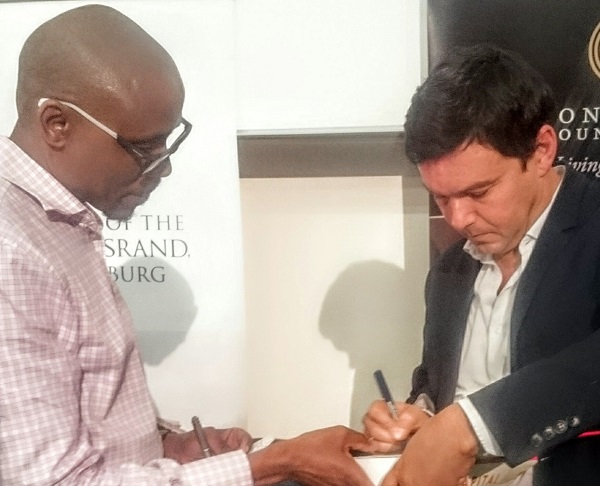Piketty on technology and economic inequality in Africa
Piketty on technology and economic inequality in Africa

French economist Thomas Piketty is in South Africa to deliver this year's annual Nelson Mandela lecture in Soweto on 3 October and share perspectives on global economic inequality as expressed in his bestseller Capital in the Twenty First Century.
Piketty made a stop at the University of Witwatersrand yesterday evening where he was welcomed with applause by an expectant audience.
"It's very easy for people sometimes to say, 'oh you know I'm not an economist, it's too complicated, I don't have an opinion.' But you know everybody should have an opinion about income and wealth...", said Piketty to the packed lecture hall.
Among the famed economists' ideas for reducing glaring inequality in South Africa mainly, is the creation of a national minimum wage and setting it at the right level, as well as creating an annual tax on net wealth.
ITWeb Africa sought Piketty's opinion on the role technological advancements play in bridging the ever increasing economic divide In Africa.
"Technology can be at the same time (sic) a powerful force to reduce inequality and to increase inequality in some cases, in particular...you know, principles of diffusion of knowledge is the most powerful force to reduce inequality. The problem is that this requires education policy and free access to education and it also requires a property regime of technology and patents which does not let some people appropriate an excessive share in this technical knowledge or the benefits that can be drawn from this technical knowledge. "
Piketty described this issue of an inequitable patent and intellectual property system as 'very serious'.
He says it has persisted for a long time and is one that nobody knows how to solve - although it remains crucial in the effort to make technology an equalising force around the world as the number of patents granted reaches record levels.
"The ability of some groups, sometimes, to appropriate the knowledge and technology produced out of public money in some cases and then to rip off the benefits because of monopoly power and the forms of spreading of information is very serious."
A less generous interpretation
Fellow panelist and Wits University Associate Professor of Economics Christopher Malikane made his divergent analysis apparent during his opportunity to respond to Piketty's presentation.
"In reading the book I was also impressed by the fact that you critique economics...however my worry in your book - which I think really goes to somehow weaken the contribution that the book is making - is the statements you make about the classical authors, for example statements you make about Ricardo. That Ricardo did not anticipate technological progress and the statements you make about Marx. That Marx did not assume technological progress in the long run but some of us who are students of Marx know very well that for Marx, technological progress in the capitalistic system is the one that generates inequality..."
Piketty capitulated in his reply to Malikane, "...did I forget to read Ricardo and Marx? I did my best, they are not always easy to read...but still I have a lot of respect for nineteenth century economics," he said to a raucous reaction and applause from the audience.
Malikane also dismissed current efforts in the ICT sector to reduce the cost of communication and democratise access to technology.
He described lower messaging costs and cheaper handset prices, access to banking, money transfers and credit for the poor through cellphones, as well as free Wi-Fi initiatives, as futile because they cannot possibly make up for the misery he says is created by the concentration of wealth and displacement of labour.
"Under capitalism technological change tends to displace labour and (that), as a result, creates unemployment and inequality. Why technology occurs like that under capitalism is because of competition. Firms compete amongst each other and the best form of fighting competition is to lower costs and the biggest cost that they want to lower is the labour cost by reducing wages or retrenching workers and replacing people with machines."